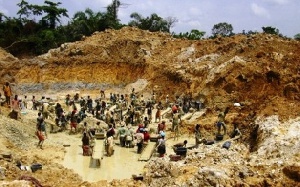Health News of Wednesday, 20 August 2014
Source: GNA
Illegal mining impeding healthcare in 21 communities
Community health outreach programmes in 21 Atwima-Mponua communities are being hampered by the unrestrained activities of illegal miners.
Indiscriminate digging of deep trenches in desperate search for gold ore has virtually wrecked all the roads running through the Ntobroso sub-health district, making it difficult for nurses and other health professionals to reach the communities.
The health workers, therefore, appealed to the government to act decisively and with urgency to tackle the activities of the illegal miners, to stop the recklessness and careless disregard for safety.
They told the Ghana News Agency (GNA) that the situation was dire and disturbing because things were rapidly losing control.
It has become almost impossible for them to catch public commercial transport and too risky to ride on their motorbikes to bring primary care to the people, they complained.
“Even more traumatic is when there is a health emergency involving women in labour,” one emphasised.
The GNA had visited the area under Strengthening Transparency Accountability and Responsiveness - (STAR) Ghana’s media auditing and tracking of development projects, an initiative launched to put a spotlight on how government’s resources were helping to transform the quality of life of the people, particularly the rural population.
The goal is to aid transparency, promote accountability and good governance.
The Atwima –Mponua sub-district is served by two facilities: Saint Peters Clinic at Ntobroso and a Community-based Health Planning and Services (CHPS) Compound at Nkrumah.
Mr Kwadwo Kyei-Fram, the District Health Director, complained about the frequent breakdown of motorbikes supplied to the health workers due to the bad roads there.
This, he said, was a major hurdle to quality care delivery – undermining health outreach and other interventions.
Atwima-Mponua, the second largest district in the Ashanti Region, in terms of land mass, incidentally is one of the most deprived.
It has a total of about 189 communities and 585 hamlets but is served by only one hospital, located at Nyinahin, the district’s capital, five health centres, two private Christian health facilities, four private maternity homes/clinics and three CHPS compounds.
STAR-Ghana is a multi- donor pooled funding mechanism (Funded by DFID, DANIDA, EU and USAID) to increase the influence of civil society and Parliament in the governance of public goods and service delivery, with the ultimate goal of improving the accountability and responsiveness of Ghana´s government, traditional authorities and the private sector.











